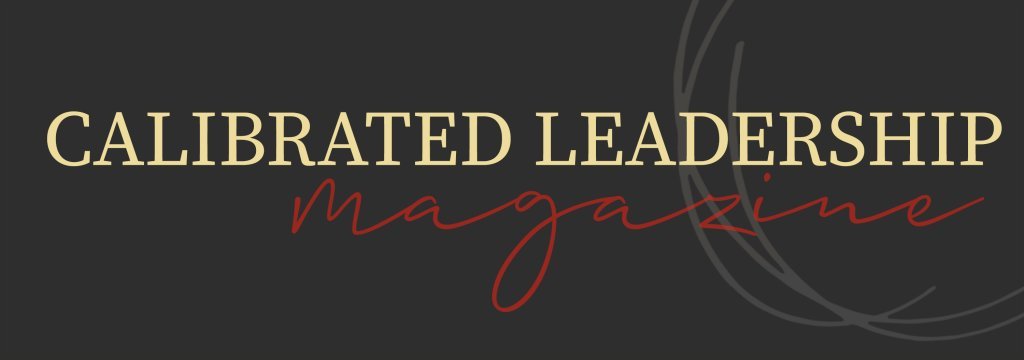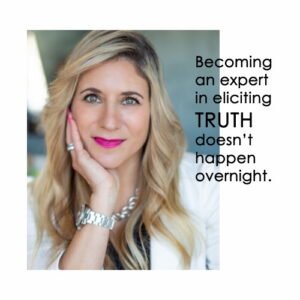
The biggest myth about TEDx is that it’s this giant, unattainable thing. It’s not! If you want a TEDx Talk, you can get a TEDx Talk. There’s one out there for you.
- Issue: Fall 2022
- Leadership, Personal development

Interview with TEDx Coach Cathlyn Melvin
Who is Cathlyn Melvin? What are you about in the world?
CM: Ooh, what am I about? Professionally, I’m all about helping business owners get heard—taking the message that’s on their hearts and getting it out into the world, where it can be heard by people who need to hear it.
Beyond that, I’m also about quiet, soft spaces, I’m about home-baked chocolatey treats, surrounding myself with plants and animals, and live theatre.
In fact, live theatre was my first career! I studied classical theatre in school and spent over a decade working as an actor, director, and teaching artist.
I’ve leaped a lot of lily pads to get to the work I do today, and my theatre career is a big one!
Tell us more about one of those lily pads that’s had a significant impact on who you are and what you do now. Why was it instrumental in your process?
CM: Honestly, they all feel significant!
From being a competitive speaker in high school, to coaching a speech team during my college years, to my career in theatre, which overlapped with the start of my copywriting and editing career . . .
I think that as far as who I am, though, theatre is the most significant one, especially when I think about what parts of my life have really shaped me into the person I am right now.
I started doing community theatre when I was 10, and had my final performance as a professional performer when I was . . . 32? Maybe? So it was a big chunk of my life. I’m neurodivergent, so being involved in theatre as a kid really helped me learn how to relate to other people and how to express myself. The children’s theatre I was part of during middle school and high school was the first place I felt at home, where I felt like I had admirable and valuable skills.
And as far as the impact my theatre training and experience has on my current work, I mean—it’s critical, really. As a TEDx coach, there are several phases I take my clients through, and my work as a theatre artist, as well as a writer and editor, informs all of it.
There’s the idea generation phase, where I help my clients sharpen their specific Idea Worth Spreading. And that uses skills I honed through text work as an actor as well as in my work as a writer, figuring out what those most essential elements of an idea are.
Then we move onto the part of the process where we customize applications and pitches—which 100% is informed by my work as a writer and editor!
From there, it’s all about drafting the talk itself, and that goes way back to my competitive speaking days, as well as using storytelling techniques I learned as a theatre artist and a writer. And my editing skills really come into play here, too, as I edit my clients’ drafts and help them move through the process from first draft to final performance draft.
And this is when it gets scary for a lot of folks, because the next step is memorization. I’m not surprised! When I was working as an actor, and I’d do “talkbacks” with an audience, there was always, ALWAYS someone in the audience who would ask, “How did you memorize all those lines?”
As an actor, that’s funny, because memorization is such a minuscule part of the process. There’s text work and table work and objectives and tactics and all sorts of things that go into building a character. Actually, just like a TEDx Talk. There’s so much more to giving a talk than just memorizing it, but memorization can be this really anxiety-producing thing, because most of us haven’t had to memorize a 10-, 12-, 15-minute chunk of text since we were 16, if then!
So the tips, tricks, and tactics I learned as an actor can be really helpful at this point, giving my clients a sense of, like, “I can do this, it’s doable” energy.
And then, of course, you put the talk on its feet and get ready for the performance. At this point, we work together on all the presentation elements that help tell the story. You’ve already got the script. You’ve told the story in words.
So now we focus on enhancing that storytelling with intonation, gestures, facial expressions, micro-body language. And that goes back to my experience as an actor and director, too. These are the things I studied for four years in college, and then honed for another 10+ years as a working actor and director.
I know there are a lot of entrepreneurs interested in TEDx, but they feel held back. From your experience, what do you find makes people hesitate to get started?
CM: So many business owners want to give a TEDx Talk! But they see all these other people giving talks, and they’re like, “Ahhh, I’m not ready yet. That person’s business is so much more established than mine.” Or “I have to have a bigger audience first.” Or “I need to have X, Y, or Z in place.”
And TEDx is really, I think, one of those things that—it’s never “too soon” to give your TEDx Talk.
And this could be a whole interview on its own, but think about: okay, the three big pillars of credibility that people strive for right now are: giving a TEDx Talk, hosting a podcast, and publishing a book.
And I believe that even if you’re a person who wants all three of those, TEDx is the place to start. And the sooner you start with TEDx, the sooner other doors will start opening for you.
(My TEDx Talk isn’t even related to my business, and it STILL opens business doors for me! It’s helped me get podcast interviews, speaking gigs in masterminds and coaching programs, and other publicity that’s led to my audience growing and my revenue growing!)
Plus, compared to hosting a podcast or publishing a book, the TEDx process is a simple one.
(Not always easy, but simple.)
Publishing a book can take 3, 4, 5 years. And a friend who’s a book coach recently told me it can cost up to $25k to write and publish a book. Holy cats!
With a podcast, you can get started quickly, but to do it cheaply is a huge investment of time—planning episodes, scheduling interviews if that’s your style, recording, editing, writing show notes . . . and then you do all the legwork of getting it out into the world. And if you want to do it the simple way, by hiring a podcast manager to do all the back-end and public-facing work for you, well, that’s an expensive (and ongoing) financial investment.
With TEDx, it’s much simpler.
You apply to events (it’s free to apply). You prep your talk. You present it. Ta-da!
And (if you want to take advantage of your current audience) you do a sort of “lazy launch” (a term I learned from my business mentor Laura Belgray) when it comes out.
But it’s the event team that handles the tech—sound, lights, videography. It gets put up on Youtube, where the TEDx channel has so much sway that even if you did nothing, it would still get seen.
(Folks reading—don’t do nothing, though. If you’re going to give a TEDx Talk, use it! Make a plan to share it!)
Plus, your TEDx adventure has an end date. It’s compact. With a book, there’s a moving target of publishing. With a podcast, you have to make the (sometimes painful) decision of when to hang up your hat.
So, from my perspective, TEDx is really the biggest payoff, as well as the simplest starting point.
Wherever you’re at in your business—whether you’re just starting out and need credibility to grow, or whether you’re more established and you want to level up—there’s a TEDx event out there for you.
As someone who’s been on the TEDx stage, as well as coaching business owners on their own TEDx Talks, what would you say people should consider before giving a TEDx Talk?
CM: Before you decide to give a TEDx Talk, imagine:
You’ve given your talk, you’ve walked off the red dot, off the stage, feeling the energy of the audience, knowing that your message is already rippling through them.
Afterward, someone from the audience goes to dinner with a friend.
“I just saw this incredible speaker,” they say. “They gave this incredibly moving talk that really got me thinking. Their talk was all about ____________________________________.”
What’s in that blank? (It can be messy; it’s just in your imagination!)
If you’ve got a general idea of what you want people to understand or consider, then you’re probably ready to start your TEDx adventure.
The only other practical piece I think business owners should consider is that if they haven’t ever done public speaking—if they’ve never guested on a podcast, or taught a workshop, or gone live on Facebook—do a handful of those sorts of events before you start applying to TEDx.
But don’t get bogged down. When I say a handful, I really mean, like, five. TEDx doesn’t require you to be a perfectly polished speaker—in fact, they prefer “ordinary people” over professional speakers. So do a few, and then get started on TEDx!
What’s the most important lesson you learned from being a TEDx speaker?
CM: The night before my TEDx Talk, all the speakers and the organizers got together at the performance space to do a dress rehearsal.
I was standing in the hallway with one of the other speakers who was waiting to go on. She leaned against the wall, fumbling with some notes.
“I’m so nervous,” she whispered, not looking at me. “I’ve never done this talk without my note cards.”
Ooh, my heart started to beat fast for her! On the outside I was like, “You know, you’ve been practicing, you know it. It’s in there.” But inside, I got nervous, too!
And when it was her turn, she got up on stage and she really struggled. Everyone watching her was silently rooting her on, we were all leaning in, trying to send her all the positive energy we could. And she did get through it. In between her stops and re-dos, she got it all out. But it was really hard. And definitely not fun.
The next morning, the day of the event, I walk into the space and I go to the greenroom, which is the holding space for the speakers until it’s their turn to go onstage. I walk in, and the perimeter of the room is lined with speakers. Some are sitting, some are standing, but they’re all kind of rocking or pacing, some have their eyes closed, and they’re all mouthing the words of their talks.
I had walked into that room feeling confident and prepared. I had a really great run the night before at dress rehearsal. Before dress rehearsal, I had run my talk more than 30 times on my feet over the course of a few weeks. So I came into the building that morning with energy I was really enjoying!
So I walk into the greenroom, and there’s all this anxiety in the air, and I thought I don’t need that! So I sort of backed out of that room and I hung out in the hallway and danced my energy through me until it was my turn to go on stage.
And what I took from that experience, when I decided to start coaching speakers, is that it’s really important to me that when people decide to give a TEDx talk, that it’s a joyful process for them. That it’s an adventure, in all the best ways.
It’s hard work. There’s a lot to be done. But even if it’s subject of your talk is heavy, I want the experience of being a TEDx speaker to be a joyful one for you.
And that experience that I had as a speaker really taught me that probably the biggest thief of that joy is being underprepared.
And these people that were in that room that morning, it’s not that they weren’t hard workers! For the most part, they had all put effort into their messages, their talks, their preparation. But the process is foreign to us.
Like I said before, about memorization specifically, as adults we don’t have to do this sort of stuff. We have no frame of reference for how long something is going to take, how many hours it’s going to take, how we need to break up those hours.
Because again with memorization, we might say, okay, it takes X number of hours to memorize a 12-minute talk, but you can’t do that all in one week. Our brains aren’t wired for it! So we need to break it down and say, how long every day do I need to work on drafting? And how many days of that do I need? And how many days a week can I realistically do that?
And I think it’s really important to have a guide who helps you break that down, who keeps you on track, so you can get to a point where you are SO prepared that you can go into your event ready to share your message in the amazing way you want to.
What’s the biggest myth about TEDx?
CM: The biggest myth about TEDx is that it’s this giant, unattainable thing. It’s not!
Yes, it’s impactful. Yes, it’s important. Yes, it’s an incredible credibility builder.
But it is also entirely achievable. There are over 3500 TEDx events across the globe every year. If you want a TEDx Talk, you can get a TEDx Talk. There’s one out there for you.
Who has been your most influential mentor, and why?
CM: His name is Brent Hazelton, and he’s an arts administrator in Milwaukee, WI.
When I met Brent, he was on the team at The Milwaukee Rep, which is an internationally-recognized regional theatre. And I was so fortunate to work with him in a bunch of capacities—he directed me in two plays, I took workshops led by him, he taught a class as an adjunct professor at my undergrad one semester, and he was somebody who, whenever I was driving through Milwaukee, I could stop up to his office and he’d take time to catch up with me.
The semester he taught at my university, he said something that I wrote down on a Post-It note, and that Post-It note has traveled with me to every apartment in every city that I’ve lived in over the last almost 15 years.
He told us:
“Find the moments when your skills fit the opportunity.”
As an actor, there’s only so much you can control. It’s the only profession I know of in which, when you submit your resume to a company, that resume lists your height, your weight, your eye color, your hair color, because all of those things matter in casting.
When you’re at an audition, you might be a fabulous fit for the role that you’re auditioning for. But ultimately it’s not just about you. It’s about how you fit into the ensemble, into the team. How you look standing next to the person they’ve already cast as your parent, or cast as your romantic partner. You can be an amazing performer and still not be right for that particular production at that particular time in that particular company.
And something similar is true about TEDx.
You can have an incredible idea worth spreading, but it’s the organizer’s job to curate a complete program. So even with your amazing idea, you might not always be the right fit for that specific event that you applied to that specific year. That’s one of the reasons that I encourage my clients to apply liberally. And when I work with clients one-on-one or in the group program that’s coming up, that’s something that I teach: what does it mean to apply liberally? And how do you find the right events that are going to be the best possible fits for you?
Tell me something about yourself that isn’t on your LinkedIn profile.
CM: I’m a self-described “cat borrower.” For a long time, it didn’t make sense for me to have a pet—I was running my first business, a touring arts ed company, so I was traveling about half of each year.
I’ve always been a cat lady and spending time with cats has always brought me such joy. So wherever I went, I made friends with cats. When I was touring with the theatre company, I’d often stay at community members’ homes, and it lifted my spirits each time I ended up at a house with cats. I sought out cat cafés. I made friends with strays. I went feeding with a feral colony caretaker. I gigged as a petsitter.
I started an Instagram account to document all my “borrowed cats” and I even wrote an article about why you should consider borrowing pets, too.
Now that I’m not touring, I have my own cat, Tucker, but I still love borrowing cats! Earlier this month I visited a friend in New York City and we went to Koneko, a cat café on the Lower East Side. And then I came home to Tucker and got lots of snuggles, too. The more cats in my life, the better!
Get your TEDx questions answered at Cathlyn’s upcoming free live Q+A.
Connect with Cathlyn on: Linkedin, Facebook. Instagram


